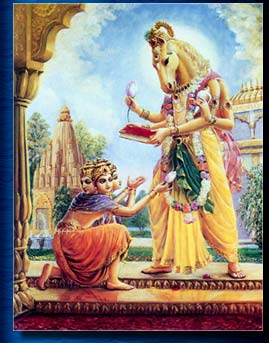
About the College | Schools & Admissions | Contact Us
Home | Resources | Donors | Volunteers | Search
For the most part we shall be following a curriculum based on the works of Parasara Muni, Satyacarya, Spujidhvaja, Varaha Mihira, and other classical Jyotish authors, along with any other pertinent references. Below is a general outline of the program of Jyotish study for the Jyotish Vidvan degree.
Foundational Topics in Vedic Astrology:
Purpose of Vedic Astrology, divisions of the Vedas, branches of Vedic Astrology, history of Vedic Astrology, philosophical issues for astrologers, the philosophy of divination, divination in other cultures, what is astrology and how it works, what it tells us, position of the astrologer; in-depth study of Fate, Freewill, and the Law of Karma; qualifications of the astrologer, ethics, divisions of time, Yuga cycles, comparing and contrasting Vedic and Western Astrology, Vedic cosmology and astronomy, historical issues, and more. Despite the title this course will challenge you.
Elements of Vedic Astrology an Analytic Study:
Definitions, elements, modalities, graha shila and karaka, friendships of grahas (planets), rasi, bhava, nakshatras, aspects, description of lagnas, graha in rasi, graha in bhava, retrogression of planets, marakas, natural and functional malefics/benefics, yogas, yoga karakas, calculation of charts by hand, many examples.
Diagnostic Tools In Vedic Astrology (Ganita):
Shodasha Vargas, Residential Strength, Graha & Bhava Balas, Vimshopak, Candra Vela, Shayanadi Bhava, Graha Samanya, Upa Grahas, Yoga Point, Arudha Chakra, Planetary Karakatwas (Tatkalika), Ayurdaya, etc.
Predictive Methods in Vedic Astrology (Jataka):
The important methods of determining future trends and predicting are dealt with. Vimshottari Mahadasa (Planetary periods), integrating previous techniques with Mahadasa; Gochara (Transits), Astakavarga; integrating Mahadasa and Gochara.
Integrated Vedic Astrology (Jataka):
Integrate the various skills he learned in the previous courses as well as general principles of judgment and astrological counseling. Parasara, Panca siddhanta of Satyacarya, other classics. Many examples of full readings synthesizing psychological, judgment of potential, Mahadasa, gochara and spiritual counseling. How to give a good reading, preparation of astrologer, preparing the seeker.
Stri-jataka - Astrology of Women:
Vedic Culture and its system of astrology recognizes the special needs and dharma of women. This course focuses on those needs and the special rules of astrology that need be considered when studying the charts of women.
Choosing the Best Time with Vedic Astrology (Muhurta):
Muhurta is a major branch of Jyotish. The inverse of Jataka (Natal Astrology), Muhurta seeks to safe guard the success of something by choosing an auspicious time for it to begin. A strong base in Jataka is presumed, but Muhurta has its own special rules.
Vastu -- Vedic geomancy:
Vastu refers to sacred geometry involved in architectural design. It was first employed chiefly in Temple design but is now extended to the mundane sphere as well. Vastu has an important astrological dimension.
Education Requirements:
The primary focus of the program will be on Jyotish. Supplemental reading includes but is not limited to: Ramayana (full version), Mahabharata (full version), Srimad Bhagavatam (all 12 cantos), Bhagavad-gita, Bhaktirasamrta Sindhu and Prabhupada Lilamrta. There will also be readings in Vaisnava etiquette and Social responsibility including Manu Samhita. These previous texts will help situate the student in the Vedic world view. And, finally there will be readings in Niti sastras such as Pancatantra, Hitopadesa, and Canakya Niti and similar texts from other cultures (Plutarch's Lives, etc.). The candidate will list each title read, and may be required to give a brief annotation for each of the materials read or some other method may be used to determine that the student has read the required material.
The purpose of these readings will be to expose the student as much as possible to time tested sources of wisdom that can be used to properly advise people in both their spiritual and material lives. Jyotish is more than just knowing the outcomes of certain planetary combinations. A excellent astrologer is also able to guide his charges through difficult times by drawing on his own wisdom. Along with study as mentioned above wisdom is enhanced by sadhana--spiritual lifestyle.
Grading Policy
The Jyotish Vidvan student must earn a minimum grade of 70% in each course, project or thesis. Failure to achieve a grade of 70% will necessitate repeating the failed item.
Practicum
Before being awarded the degree the student must also demonstrate his mastery of the subject by successfully reading in the presence of the instructor the horoscopes of as many people as it takes to satisfy the instructor. This should be done within a specified period of time determined by the instructor after taking final written exams. The requisite level of mastery may require a period of apprenticeship with the instructor.
